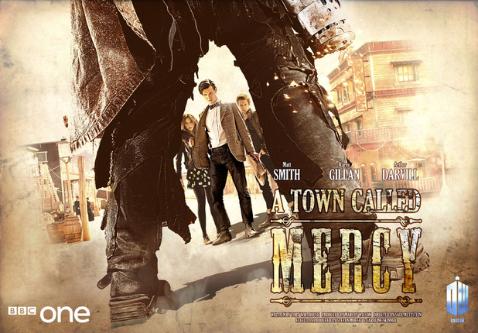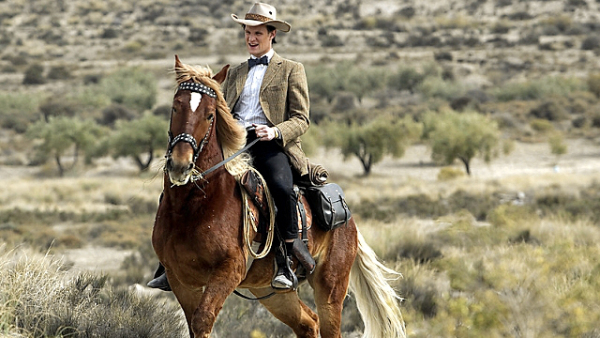

Billie Silvey
The Morality
Of Dr. Who
Of Dr. Who

In every Dr. Who episode, you find the classic Western situation—a
stranger comes to town, and things are never the same. Because of the
TARDIS, that town can be anywhere at any time.
Graeme McMillan calls the show “oddly kind-hearted.” “Its hero
doesn’t rely on violence or even might to win the day, but instead, on
what comedian Craig Ferguson described as ‘the triumph of intellect
and romance over brute force and cynicism.’”
Dr. Who is life affirming. He roams the galaxy rescuing people (of all
species) and righting wrongs. He is infinitely old and wise, while
maintaining a youthful enthusiasm. Dr. Who celebrates the best in each
of us—our intelligence, curiosity and kindness—and our endless
possibilities when we remain open to them.
As a Christian and a pacifist, I'm especially interested in his morality, his
sense of right and wrong--the way he maintains it in challenging
circumstances, and expecially when he seems to violate it.
In an episode that aired recently in the US, the doctor plays the role of
a hero in an actual Western, and against his usual morality, he draws a
gun.
In “A Town Called Mercy,” the doctor (Matt Smith) and his
companions, Amy Pond (Karen Gillan) and Rory Williams (Arthur
Darvill) are on their way to the Day of the Dead festival in Mexico,
when the TARDIS (famous for malfunctioning) lands in the American
West.
The Gunslinger, a cyborg reminiscent of Frankenstein’s monster, is
holding a town hostage until they turn over his creator, Kahler-Jex. Jex
created the cyborg to use as a weapon in a civil war on his planet. The
Gunslinger, seeking revenge, demands that Jex leave the town so he
can kill him.
The doctor borrows a horse from the preacher, who says, "He's called
Joshua. It's from the Bible. It means 'the Deliverer.'"
"No he isn't," the doctor replies. "I speak horse. He's called Susan.
And he wants you to respect his life choices."
The doctor drags Jex to the edge of town, despite Amy's protest.
"See, this is what happens when you travel alone for too long," she
says.
James F. McGrath of the religious website Patheos interprets Amy's
comment to mean that, "when we loosen our ties to other human
beings, we can begin to treat matters of mercy and justice, and the fate
of other persons, differently, impersonally."
When Isaac, the town marshal, is fatally wounded trying to save Jex, he
gives his badge to the doctor, who gives it to the cyborg, making him
the defender of Mercy. "A Town Called Mercy" actually "is about
mercy, about forgiveness, about war crimes, about vengeance, and
about justice," according to McGrath.
"Even though the doctor is an alien, he teaches us a lot about what it
means to be human," according to Courtland Lewis and Paula Smithka
in the introduction to Dr. Who and Philosophy: Bigger on the Inside.
stranger comes to town, and things are never the same. Because of the
TARDIS, that town can be anywhere at any time.
Graeme McMillan calls the show “oddly kind-hearted.” “Its hero
doesn’t rely on violence or even might to win the day, but instead, on
what comedian Craig Ferguson described as ‘the triumph of intellect
and romance over brute force and cynicism.’”
Dr. Who is life affirming. He roams the galaxy rescuing people (of all
species) and righting wrongs. He is infinitely old and wise, while
maintaining a youthful enthusiasm. Dr. Who celebrates the best in each
of us—our intelligence, curiosity and kindness—and our endless
possibilities when we remain open to them.
As a Christian and a pacifist, I'm especially interested in his morality, his
sense of right and wrong--the way he maintains it in challenging
circumstances, and expecially when he seems to violate it.
In an episode that aired recently in the US, the doctor plays the role of
a hero in an actual Western, and against his usual morality, he draws a
gun.
In “A Town Called Mercy,” the doctor (Matt Smith) and his
companions, Amy Pond (Karen Gillan) and Rory Williams (Arthur
Darvill) are on their way to the Day of the Dead festival in Mexico,
when the TARDIS (famous for malfunctioning) lands in the American
West.
The Gunslinger, a cyborg reminiscent of Frankenstein’s monster, is
holding a town hostage until they turn over his creator, Kahler-Jex. Jex
created the cyborg to use as a weapon in a civil war on his planet. The
Gunslinger, seeking revenge, demands that Jex leave the town so he
can kill him.
The doctor borrows a horse from the preacher, who says, "He's called
Joshua. It's from the Bible. It means 'the Deliverer.'"
"No he isn't," the doctor replies. "I speak horse. He's called Susan.
And he wants you to respect his life choices."
The doctor drags Jex to the edge of town, despite Amy's protest.
"See, this is what happens when you travel alone for too long," she
says.
James F. McGrath of the religious website Patheos interprets Amy's
comment to mean that, "when we loosen our ties to other human
beings, we can begin to treat matters of mercy and justice, and the fate
of other persons, differently, impersonally."
When Isaac, the town marshal, is fatally wounded trying to save Jex, he
gives his badge to the doctor, who gives it to the cyborg, making him
the defender of Mercy. "A Town Called Mercy" actually "is about
mercy, about forgiveness, about war crimes, about vengeance, and
about justice," according to McGrath.
"Even though the doctor is an alien, he teaches us a lot about what it
means to be human," according to Courtland Lewis and Paula Smithka
in the introduction to Dr. Who and Philosophy: Bigger on the Inside.

In "A Town Called Mercy," Matt Smith as Dr. Who dons a Stetson hat and trades his TARDIS for a horse named Susan.
October 2013
Movie poster style art advertises the Dr. Who
episode, "A Town Called Mercy."
episode, "A Town Called Mercy."